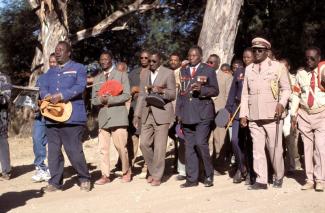Colonial crimes
Historical guilt

Recognition, apology and compensation are the core concepts of a German politics of memory, which itself is a key component of post-war German identity. This approach proved valuable in the reconciliation with victims of Nazism. However, the debate regarding the genocide committed by German soldiers in Namibia continues. In this case, a responsible handling of history appears to require yet another struggle over history and its current ramifications. Herero and Nama organisations have brought a suit against Germany with a New York court, suing for recognition of the genocide.
In October 1904, Lothar von Trotha, the commander-in-chief of the German colonial protection force in German South West Africa, informed the Herero people in a letter that they were no longer German subjects and therefore had to leave the country: „Within German borders, every Herero, with or without a gun, with or without cattle, will be shot. I’m not taking in any women or children; they will be driven back to their people, or they will be shot.”
This shoot-to-kill order served as basis for the first genocide of the 20th century. It documents the intent of annihilation of all Herero and later also Nama. At the same time, even in the context of colonial mass murder, Trotha tried to keep up pretences: In an order of the day, only directed to the troops, the general explained that German soldiers should only fire above the heads of women and children, in order to drive them away and thus preserve the “good reputation” of the troops.
This order of the day, however, was cynical, as the historian Jürgen Zimmerer explains: „Retreating meant death by thirst,” because the colonial powers had organised the displacement. The Herero were already pushed back into the Omaheke desert where German troops occupied the water holes – the refugees were meant to die of thirst.
Trotha’s doublespeak expressed colonial arrogance: He didn’t consider well-planned mass murder as problematic, but a massacre committed against women and children would have tainted the German prestige in the world.
In December 1904 the government of the Reich cancelled this firing order. At this point in time, a majority of the displaced Herero had already died in the desert. In a telegram on 11 December 1904, Imperial Chancellor Bernhard von Bülow gave the instruction to intern „the rests of the Herero people“ in „concentration camps“ – this was the first time that a German government used this term (see box). In German South West Africa only half of the internees survived.
Consequences of the genocide
In the war years 1904 to 1908, an estimated 65,000 to 85,000 people were killed in this act of planned mass murder. The consequences of displacement and genocide are still pervasive in Namibia today: A great part of the fertile land is owned by white Namibians, mostly of German origin (see Henning Melber in D+C/E+Z e-Paper 2017/07, p. 29).
For a long time, the post-war German government did not recognise the colonial wars as genocide. In 2004, Heidemarie Wieczorek-Zeul, then the federal minister for economic cooperation and development, said: “In the sense of our common Lord’s Prayer, I ask for forgiveness of our trespasses.” The government immediately declared this indirect admission of guilt as a “private opinion”. There was great concern that an official concession would trigger reparation demands. German historians and civil-society activists, however, have for over 20 years classified the war and killings as genocide and demand its official acknowledgment.
Before the genocide, the Herero used to be one of the biggest groups in the country, but like the Nama, afterwards they were marginalised for a long period of time. For their descendants, the recognition of the historic atrocities is a necessary precondition for a thorough analysis of the consequences. Israel Kamatjike, representative of the Herero in Germany, says: “We want an apology, also in order to make reparations possible.” The lands which were expropriated after the genocide would need to be redistributed within the context of reparations, he maintains.
The official attitude of the German government changed in 2015, in the context of debates around the recognition of the Armenian genocide by the Turkish state. Member of Parliament Karamba Diaby, himself of Senegalese origin, pointed out: “Whoever says A, needs to say N.” His message was that the mass murder of the Herero and Nama should be judged by the same criteria as that of the Armenians. The then president of German Parliament Norbert Lammert came to share this view: “Measured by today’s standards of international law, the suppression of the Herero uprising was indeed a genocide,” he wrote in the magazine “Die Zeit”.
Since then, German and Namibian delegations negotiate in camera about a formal recognition. Herero and Nama organisations, however, have no seats at the table. They worry that Germany will try to set off development aid against reparations. Regarding its financial help for the country, the German government indeed points to Germany’s “special relationship” to Namibia.
Herero activist Kamatjike claims Germany wants to predetermine what should be done with the reparation funds. This, however, is not considered as acceptable, since “reparations come without conditions.” On top of that, they have nothing to do with development aid, Kamatjike says.
The position of the German government – namely that these issues could only be negotiated with the Namibian government – appears to indicate historical amnesia. After all, the borders of Namibia and the current majorities in the country are consequences of German colonial aggression, resulting in the marginalisation of Herero and Nama.
Lawsuit in New York
In this context, a claim filed by Herero at a New York court is politically highly charged: Since March 2017 legal proceedings have been taken up, in which the US-based Herero representative Vekuii Rukoro, together with Herero-Chiefs from Namibia, is bringing a suit against Germany. It seeks a full recognition of the genocide, but also the inclusion of Herero representatives in the bi-governmental negotiations.
The German government had apparently assumed that the case would be dismissed. The first hearing was postponed several times and was set for mid-October.
This case is being closely monitored internationally. Germany’s willingness to talk with Namibia about the genocide was internationally appreciated – particularly in France and Britain, two countries with colonial pasts of their own. By now, however, Germany’s reputation is negatively impacted by the impression that the government remains unwilling to assume full responsibility.
Meanwhile, the Tanzanian defence minister Hussein Mwinyi has announced that he is exploring options for a lawsuit regarding the German colonial war of extermination in eastern Africa: During the Maji-Maji war from 1905 to 1907, in the area of contemporary Tanzania approximately 300,000 people died as a result of German colonial aggression.
The German government needs to face the core demands of the Herero and Nama as well as other descendants of colonised people. Experience shows that the triad of recognition, apology and compensation has proven a helpful path to deal with past atrocities (also note article in D+C/E+Z e-Paper 2017/10, p. 9).
Joshua Kwesi Aikins is a political scientist at the department for development and postcolonial studies at the University of Kassel. He is active in the organisation „Berlin Postkolonial“ and lives in Berlin.
kwesiaikins@gmail.com
Links
Civil society alliance „Völkermord verjährt nicht/No Amnesty for Genocide“:
http://genocide-namibia.net/alliance/
Berlin-Postkolonial e.V.:
http://www.berlin-postkolonial.de/












